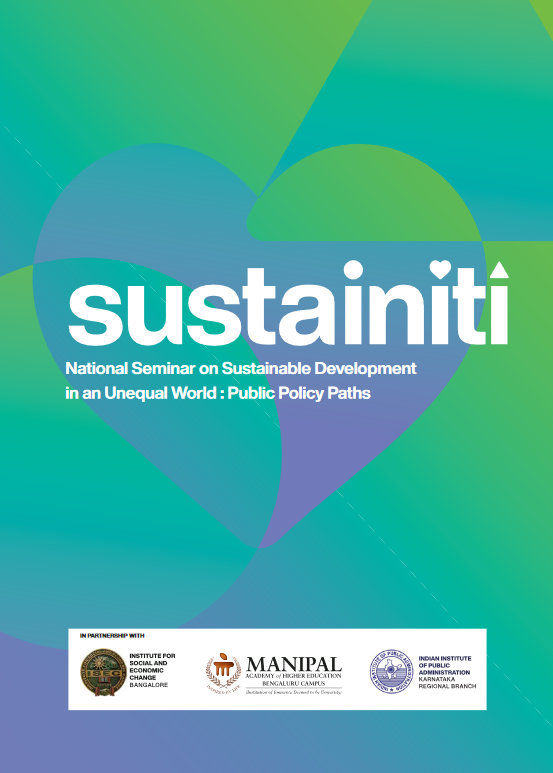

'Sustainiti: Sustainable Development in an Unequal World: Public Policy Paths'- Two day National Seminar Conducted by ISEC Bangalore, MAHE-Bangalore and IIPA-KRB
Wed, 05 Jun 2024 - Thu, 06 Jun 2024
Bangalore, Inde
Organized by: Institute for Social and Economic Change, Manipal Academy of Higher Education, Bangalore and Indian Institute of Public Administration- Karnataka Regional Branch
Contact: anilkumar@isec.ac.in
Two-Day National Seminar on
Sustainable Development in an Unequal World: Public Policy Paths
June 5th--6th 2024
Concept Note
Development continues to be one of the most argued and contested concepts in social science and politics from its early incorporation, post-de-colonization, into the public policy discourse in the 1940s through the neo-liberal era since the early 1990s. However, the process of development has been inherently lopsided benefitting the rich/industrialized nations and classes, while adversely affecting the economies and ecosystems of developing countries, especially the marginalized communities within them. Moreover, the term ‘sustainable development’, conceptualized and adopted as a new paradigm of development, lacks a coherent interpretation besides failing to draw insights into the social and environmental phenomena. Apart from the detrimental effects on environment, it is also difficult to interpret the effects of policies aimed at fostering environmentally sound and meaningful forms of sustainable development. So, what is sustainable development? How can social and economic policies strive to achieve sustainable development? How do policymakers address the trade-off between ecological sustainability and equitable development? Can we dream of achieving economic development, which is both sustainable and egalitarian at the same time? Can we achieve inclusive growth through targeted reducing of inequality? What are the policy implications of sustainable development? Can sustainable development offer better healthcare, education, access to better quality education and other amenities – such as clean drinking water and sanitation as well as promote participatory development and gendered equitable society?
In this context, the proposed seminar intends to explore the relationship between sustainable development and socio-economic inequality on the one hand and ecological sustainability on the other, while emphasizing the pivotal role of public policy in addressing these questions. The seminar is expected to explore innovative and pragmatic policy approaches, consider the complexities and trade-offs involved, and present case studies and best practices. More importantly, the seminar dwells on the public policy options that lie ahead in dealing with the issue of sustainability in an increasingly unequal world. A synthesis of these elements helps gain a comprehensive understanding of how public policies can simultaneously promote ecological sustainability and development towards reducing economic and social inequality on a global scale.
Participants of the seminar are expected to present papers on emerging trends, potential challenges and opportunities that lie ahead. This forward-looking approach includes considerations of how technological advancements and innovations, global inequality and socio-cultural transformation shape the structure of public policy in addressing the above aspects. In essence, how might these current trends and trajectories shape the future from a variety of perspectives and envision the policy design. This seminar intends to be multidisciplinary in approach wherein scholars, students and development
practitioners share their views on sustainable development towards reducing global inequality. We expect scholars to contribute papers that help foster a more equitable and resilient society.











